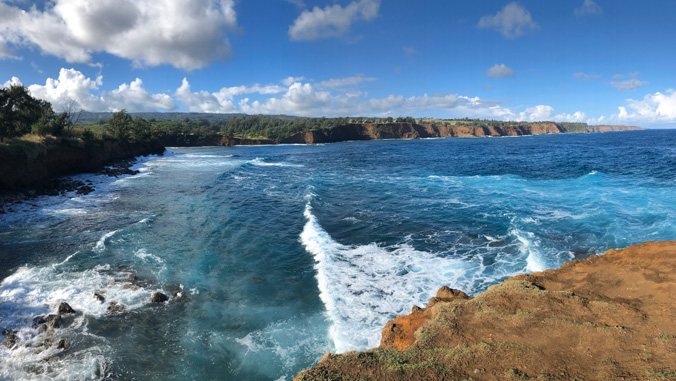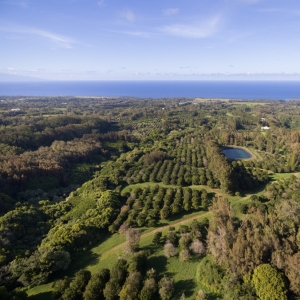
The Hawaiʻi Community Foundation (HCF) announced plans for ʻIole, a nonprofit place-based research center and living scientific laboratory in Kohala on Hawaiʻi Island that will bring together academic experts, Native Hawaiian practitioners, community members, students and government leaders to develop sustainability solutions rooted in ancestral knowledge and indigenous practices. Leveraging expertise and resources from partners at the University of Hawaiʻi and Arizona State University (ASU), ʻIole will prioritize its initial programming around three focus areas: energy security, food security and place-based learning.
ʻIole is the result of approximately 2,400 acres of land and assets in the process of being generously gifted to HCF from the New Moon Foundation and the Kohala Institute.
The vision for ʻIole is based on the Native Hawaiian sense of shared responsibility to care for, learn from, and thrive off of defined, self-sustaining sections of land known as ahupuaʻa. The nonprofit will restore and cultivate the ʻIole ahupuaʻa, while developing solutions-based models that can be scaled and replicated in other parts of the world. Solutions emerging from ʻIole will be deeply connected and rooted to the richness and resilience of the historic community of Kohala.

“We are excited at this opportunity to collaboratively envision a 21st century ahupuaʻa,” said UH President David Lassner. “ʻIole can be a place grounded in Hawaiian values and knowledge where we are jointly committed to the innovation and courage necessary to integrate traditional and modern ways of learning, doing and living. The faculty and students of our ten UH campuses can bring to ʻIole our wealth of traditional knowledge of our islands, our understanding of hundreds of years of sustainable living here, our decades of cutting edge research across every discipline and on every island, and our deep commitment to learn how we can all live together sustainably.”
Alapaki Nahale-a, a current UH regent and former senior director of community engagement and resources for Hawaiʻi Island at Kamehameha Schools, will serve as Interim CEO of ʻIole. Nahale-a will be responsible for overseeing operations, staffing and the execution of programming. His initial priorities will be to develop the mission, vision and values for the nonprofit; establish a collaborative community process for discussions and program development.
“I am honored and humbled to begin the necessary process of establishing a strong foundation for ʻIole,” said Nahale-a. “We have the opportunity to restore this special place back to abundance, much like our ancestors before us did. As we listen to ʻIole and do what is right for the land, it is my hope that others will be inspired to take responsibility for their own place and share in the belief that humans can live as a healthy part of earth’s ecosystem.”
ʻIole is an opportunity to bring together place, people, belief, commitment, and action in a way that changes how people behave in the world, ensuring future generations the chance for prosperity.
Thuy Nguyen Fujimoto, president and co-founder of the New Moon Foundation; Bennett Dorrance Jr., vice-president and co-founder of the New Moon Foundation; and Jason Fujimoto, president of the Kohala Institute, shared the following in a joint statement: “Our vision is for ʻIole to be a place and values-based living classroom that practices and models collaboration for the benefit of our Hawaiʻi and global communities. We believe and trust in the Hawaiʻi Community Foundation and its partners to bring new capacity to ʻIole and carry the important responsibility of this place into its next chapter.”
“The world needs authentic solutions to our planet’s most urgent issues, from food security to climate change, to ensure a sustainable future for all people. Solutions that combine ancestral knowledge and indigenous practices with revolutionary science will produce a culturally sound framework that protects the well-being of both people and place,” said Micah Kane, CEO and president of the Hawaiʻi Community Foundation. “Through our collaborative work at ʻIole, Hawaiʻi has the opportunity to continue to lead the fight against climate change and affect social issues impacting communities here, and across the globe.”
“The ʻIole ahupuaʻa is the epitome of potential for sustainable action and community resilience here on Hawaiʻi Island,” said Mayor Mitch Roth. “Our administration has committed to fostering a Hawaiʻi Island where our keiki can thrive and succeed for generations to come, and in that, we are excited to support ʻIole and its partnering organizations in every way possible.”
HCF, UH and ASU have committed to jointly raising $6.75 million for the operations of ʻIole for the first three years of the project. The funding allows ʻIole to focus on properly implementing programming and creating impact without being burdened by financial stress or constraint.
“ʻIole is a unique opportunity to bring together the people of Hawaiʻi, Hawaiʻi community groups, Hawaiʻi government leaders, and university partners to advance community engagement, scientific research and educational opportunities—all in one place,” said ASU President, Michael Crow. “Our hope is to come together and work collaboratively to improve the health of our lands, waters and planet.”
HCF has engaged additional local organizations, including Kamehameha Schools and Hawaiian Electric Industries, which are directly interested and impacted by ʻIole’s focus areas. Their interest and involvement will further direct and enhance the global value of the solutions developed at ʻIole.

